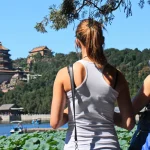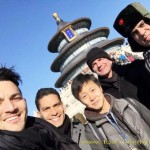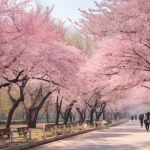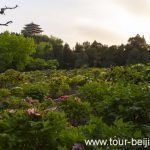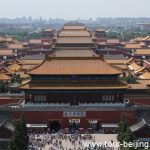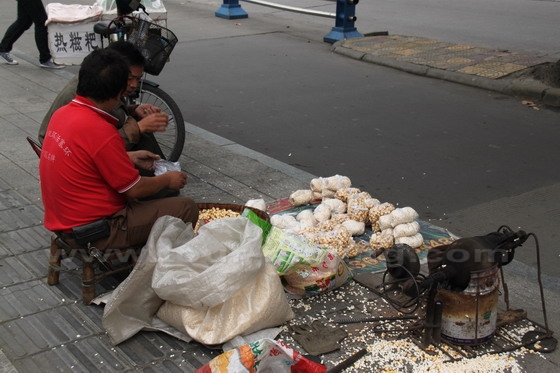
Plan your Chengdu Tour? Chengdu lies in the southwest of China, in the center of the West-Sichuan Basin. At an average 500 meters above the sea level, the city with its surrounding area of 12 thousand square kilometers-with an average annual temperature of 15.5 degrees centigrade, an average rainfall of 997 millimeters, and 26.4 billion cubic meters in water resources-is known to the world for its beautiful land and its mild climate.
Features & Attractions
•Wolong, Chengdu
•Sanxingdui Museum
•Dujiangyan Irrigation Project
•Chengdu Research Base of Giant Panda Breeding
•Xiling Snow Mountain
•Jinli Old Street, Chengdu
•Qingcheng Mountain
•Luodai Ancient Town
•Wenshu Temple, Chengdu
•Wolong, Chengdu
•Sanxingdui Museum
•Dujiangyan Irrigation Project
•Chengdu Research Base of Giant Panda Breeding
•Xiling Snow Mountain
•Jinli Old Street, Chengdu
•Qingcheng Mountain
•Luodai Ancient Town
•Wenshu Temple, Chengdu
Wolong National Natural Reserve
Wolong National Nature Reserve is located in the boundaries of Wenchuan County, 134 kilometers away from the capital city Chengdu. The Reserve is 52 kilometers long from east to west, and 62 kilometers wide from south to north, covering an area of about 700,000 hectares. Established in 1963, the Reserve joined the International Man and Biosphere Reserve Network of UNESCO in 1980, and its main targets for protection are forest ecosystem and precious animals like giant pandas.
Ticket Price: 10Yuan (for the entrance)
Opening Time: 08:00-18:00
How to get there: take the long-distance bus from Chengdu Ximen Bus Station and get off at Wolong on the half way
Wolong National Nature Reserve is located in the boundaries of Wenchuan County, 134 kilometers away from the capital city Chengdu. The Reserve is 52 kilometers long from east to west, and 62 kilometers wide from south to north, covering an area of about 700,000 hectares. Established in 1963, the Reserve joined the International Man and Biosphere Reserve Network of UNESCO in 1980, and its main targets for protection are forest ecosystem and precious animals like giant pandas.
Ticket Price: 10Yuan (for the entrance)
Opening Time: 08:00-18:00
How to get there: take the long-distance bus from Chengdu Ximen Bus Station and get off at Wolong on the half way
Sanxingdui Museum
Located in Northeast of Sanxingdu archeological site, 40 kilometers (about 24.9 miles) north of Chengdu City, Sanxingdui Museum covers an area of 4,000 square meters (nearly 1 acre), and opened in October 1997 this is an archeological museum with excellent modern facilities.
The whole design of the museum is simple, but with a solemn style. The flame is peculiar. The main object is a deformed spiral. It has the poetic charm with historical, geographical features and cultural art. It fully shows the broadness and profundity of Sanxingdui culture.
Ticket Price: 80Yuan
Opening Time: 8:30-18:00 (the first exhibition hall); 8:30-18:30 (the second exhibition hall)
How to get there: Bus No. 6 to the Sanxingdui Museum
Located in Northeast of Sanxingdu archeological site, 40 kilometers (about 24.9 miles) north of Chengdu City, Sanxingdui Museum covers an area of 4,000 square meters (nearly 1 acre), and opened in October 1997 this is an archeological museum with excellent modern facilities.
The whole design of the museum is simple, but with a solemn style. The flame is peculiar. The main object is a deformed spiral. It has the poetic charm with historical, geographical features and cultural art. It fully shows the broadness and profundity of Sanxingdui culture.
Ticket Price: 80Yuan
Opening Time: 8:30-18:00 (the first exhibition hall); 8:30-18:30 (the second exhibition hall)
How to get there: Bus No. 6 to the Sanxingdui Museum
Dujiangyan Irrigation Project
Construction of the Dujianyang Irrigation system located in Chengdu, Sichuan Province, began in the 3rd century BC, and it continues to control the waters of the Minjiang river and distribute it to the fertile farmland of the Chengdu plains.
Chengdu Dujiangyan is the oldest and only surviving no-dam irrigation system in the world; and a wonder in the development of Chinese science. The project consists of three important parts, namely Yuzui, Feishayan and Baopingkou scientifically designed to automatically control the water flow of the rivers from the mountains to the plains throughout the year.
Ticket Price: free
Opening Time: 08:30-17:00 (weekdays); 08:00-18:00 (weekends)
How to get there: Bus No. 649 to the Dujiangyan Irrigation Project
Construction of the Dujianyang Irrigation system located in Chengdu, Sichuan Province, began in the 3rd century BC, and it continues to control the waters of the Minjiang river and distribute it to the fertile farmland of the Chengdu plains.
Chengdu Dujiangyan is the oldest and only surviving no-dam irrigation system in the world; and a wonder in the development of Chinese science. The project consists of three important parts, namely Yuzui, Feishayan and Baopingkou scientifically designed to automatically control the water flow of the rivers from the mountains to the plains throughout the year.
Ticket Price: free
Opening Time: 08:30-17:00 (weekdays); 08:00-18:00 (weekends)
How to get there: Bus No. 649 to the Dujiangyan Irrigation Project
Panda Breeding and Research Center
Chengdu Research Base of Giant Panda Breeding, or simply Chengdu Panda Base, is a non-profit research and breeding facility for giant pandas and other rare animals.
Located on the mountain of Futoushan in the northern suburbs of Chengdu, Panda Breeding and Research Center houses numerous exhibits explaining and detailing the knowledge that has been attained through long years of research. Verdant bamboo, bright flowers, fresh air, a natural hill scene and a beautiful artificial view are merged ingeniously at the base.
Ticket Price: 58Yuan
Opening Time: 08:00-18:00
How to get there: Buses No. 45, 71, 69, 302, 83 or 60 and then transfer to Chengxiang Bus No. 1 to the Panda Breeding and Research Center
Chengdu Research Base of Giant Panda Breeding, or simply Chengdu Panda Base, is a non-profit research and breeding facility for giant pandas and other rare animals.
Located on the mountain of Futoushan in the northern suburbs of Chengdu, Panda Breeding and Research Center houses numerous exhibits explaining and detailing the knowledge that has been attained through long years of research. Verdant bamboo, bright flowers, fresh air, a natural hill scene and a beautiful artificial view are merged ingeniously at the base.
Ticket Price: 58Yuan
Opening Time: 08:00-18:00
How to get there: Buses No. 45, 71, 69, 302, 83 or 60 and then transfer to Chengxiang Bus No. 1 to the Panda Breeding and Research Center
Xiling Snow Mountain
Xiling Snow Mountain is about 95 kilometers away from Chengdu and covers an area of 482.8 kilometers. It acquires its fame when Du Fu lived in seclusion in the east thatched house and wrote down the famous phrase “the window contains the range of the century snow, the gate anchors the Wu Wanli ship.
The Xiling Snow Mountain is divided into the front mountain and the latter mountain. The people usually refer to the mountain ski field when mentioning the Xiling snow mountain. The latter mountain is better than the front mountain in terms of sceneries and for playing with the snow.
Ticket Price: 100Yuan
Opening Time: 07:00-17:50
How to get there: take buses from Xinnanmen Bus Station and Jinsha Bus Station to the Xiling Snow Mountain
Xiling Snow Mountain is about 95 kilometers away from Chengdu and covers an area of 482.8 kilometers. It acquires its fame when Du Fu lived in seclusion in the east thatched house and wrote down the famous phrase “the window contains the range of the century snow, the gate anchors the Wu Wanli ship.
The Xiling Snow Mountain is divided into the front mountain and the latter mountain. The people usually refer to the mountain ski field when mentioning the Xiling snow mountain. The latter mountain is better than the front mountain in terms of sceneries and for playing with the snow.
Ticket Price: 100Yuan
Opening Time: 07:00-17:50
How to get there: take buses from Xinnanmen Bus Station and Jinsha Bus Station to the Xiling Snow Mountain
Jinli Street
Jinli Street is situated in the south district of Chengdu City . It is recorded that as early as the Qin Dynasty (221 BC – 206 BC), Jinli Street was the most famous place for baldachin – a rich, ornate cloth.
Chengdu Jinli Street is a place where visitors can enjoy the delicious Sichuan food and snacks and the local remarkable folk culture. Old buildings line the street and housed inside these buildings are tea houses, stores and Hotels.
Wandering into a store at random, visitors will discover various kinds of Embroidery, lacquerware, folk handicrafts, curios, or calligraphies and paintings of celebrities, which provide good shopping opportunity as well as feast for eyes.
Ticket Price: free
Opening Time: the whole day
How to get there: Buses No. 1, 82, 57 or 29 from the downtown to the Jinli Old Street
Jinli Street is situated in the south district of Chengdu City . It is recorded that as early as the Qin Dynasty (221 BC – 206 BC), Jinli Street was the most famous place for baldachin – a rich, ornate cloth.
Chengdu Jinli Street is a place where visitors can enjoy the delicious Sichuan food and snacks and the local remarkable folk culture. Old buildings line the street and housed inside these buildings are tea houses, stores and Hotels.
Wandering into a store at random, visitors will discover various kinds of Embroidery, lacquerware, folk handicrafts, curios, or calligraphies and paintings of celebrities, which provide good shopping opportunity as well as feast for eyes.
Ticket Price: free
Opening Time: the whole day
How to get there: Buses No. 1, 82, 57 or 29 from the downtown to the Jinli Old Street
Mt. Qingcheng
Mt. Qingcheng, 65km west of Chengdu, is one of the ancient cradles of Daoism. The mountain has numerous Daoist temples and sites along the paths to its peak. The area is green all year round and is known for its secluded tranquility.
The Mt. Qingcheng can be divided into two parts – the anterior Mt. Qingcheng and the posterior Mt. Qingcheng. The anterior Mt. Qingcheng is the main part of the scenic spot, covering an area approximately 15 square kilometers (about 3706 acres) that possesses alluring natural beauty and an abundance of cultural relics and historic sites.
Ticket Price: 90Yuan (the front mountain); 20Yuan (the latter mountain)
Opening Time: 08:30-17:00 (weekdays); 08:00-18:00 (weekends)
How to get there: There are Tourist Buses for Qingcheng Mountain from Chengdu Train Station and Ximen Bus Station. The price is 60 per person and takes about 2 hours.
Mt. Qingcheng, 65km west of Chengdu, is one of the ancient cradles of Daoism. The mountain has numerous Daoist temples and sites along the paths to its peak. The area is green all year round and is known for its secluded tranquility.
The Mt. Qingcheng can be divided into two parts – the anterior Mt. Qingcheng and the posterior Mt. Qingcheng. The anterior Mt. Qingcheng is the main part of the scenic spot, covering an area approximately 15 square kilometers (about 3706 acres) that possesses alluring natural beauty and an abundance of cultural relics and historic sites.
Ticket Price: 90Yuan (the front mountain); 20Yuan (the latter mountain)
Opening Time: 08:30-17:00 (weekdays); 08:00-18:00 (weekends)
How to get there: There are Tourist Buses for Qingcheng Mountain from Chengdu Train Station and Ximen Bus Station. The price is 60 per person and takes about 2 hours.
Luodai Ancient Town
Luodai Ancient Town, located in eastern Chengdu, is the largest Hakka community in southwest China. Luodai was established in years of the Three Kingdoms and is a provincial level ancient town with profound culture.
The houses, courtyards and streets in Luodai are all in the ancient style of Qing Dynasty (1644-1911) or the Republic period (1912-1949). There are one 1,000-meter-long main street and seven alleys in the ancient town. The dwelling houses along the main street are all enclosed courtyards with an open area in the middle and a main building decorated with carvings of turtle and flower. The roofs of the houses are all covered with cogon and small black tiles.
Entrance Fee: free
Opening Hours: the whole day
How to get there: Buses No. 71, 81 or 58 to Wugui Bus Station, then take Bus No. 219 to Luodai Ancient Town
Luodai Ancient Town, located in eastern Chengdu, is the largest Hakka community in southwest China. Luodai was established in years of the Three Kingdoms and is a provincial level ancient town with profound culture.
The houses, courtyards and streets in Luodai are all in the ancient style of Qing Dynasty (1644-1911) or the Republic period (1912-1949). There are one 1,000-meter-long main street and seven alleys in the ancient town. The dwelling houses along the main street are all enclosed courtyards with an open area in the middle and a main building decorated with carvings of turtle and flower. The roofs of the houses are all covered with cogon and small black tiles.
Entrance Fee: free
Opening Hours: the whole day
How to get there: Buses No. 71, 81 or 58 to Wugui Bus Station, then take Bus No. 219 to Luodai Ancient Town
Wuhou Memorial Temple
Located in the south suburb of Chengdu, Wuhou Memorial temple covers 37,000 square meters (398,277 square feet). Wuhou (Martial Marquis) Memorial Temple is dedicated to Zhuge Liang, Martial Marquis of Shu in the Three Kingdoms.
The main body of the temple is divided into five sections, the Gate, the second Gate, the Hall of Liu Bei, the corridor, and the Hall of Zhuge Liang, all of which run south to north. Inside, clay sculptures of Shu Emperor and ministers stand together, making them a special feature.
Ticket Price: 60Yuan
Opening Time: 08:00-17:50
How to get there: Bus No.14,26, 53, 57, 213, 214
Located in the south suburb of Chengdu, Wuhou Memorial temple covers 37,000 square meters (398,277 square feet). Wuhou (Martial Marquis) Memorial Temple is dedicated to Zhuge Liang, Martial Marquis of Shu in the Three Kingdoms.
The main body of the temple is divided into five sections, the Gate, the second Gate, the Hall of Liu Bei, the corridor, and the Hall of Zhuge Liang, all of which run south to north. Inside, clay sculptures of Shu Emperor and ministers stand together, making them a special feature.
Ticket Price: 60Yuan
Opening Time: 08:00-17:50
How to get there: Bus No.14,26, 53, 57, 213, 214
